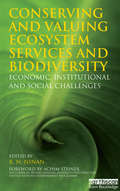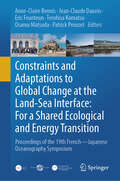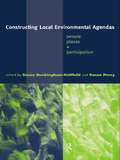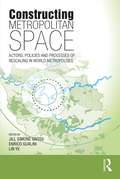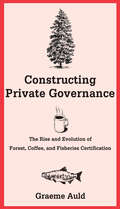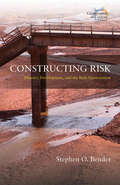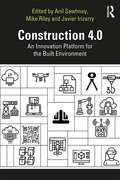- Table View
- List View
Conserving and Valuing Ecosystem Services and Biodiversity: Economic, Institutional and Social Challenges
by K. N. NinanThis book comprehensively addresses the economic, social and institutional difficulties in conserving biodiversity and the ecosystem services that it provides. It covers a wide range of issues such as biodiversity, ecosystem services and valuation in the context of diverse ecosystems such as tropical forests, marine areas, wetlands and agricultural landscapes, non-timber forest products, incentives and institutions, payments for ecosystem services, governance, intellectual property rights and the protection of traditional knowledge, management of protected areas, and climate change and biodiversity. It also covers the application of environmental economics and institutional economics to different cases and the use of techniques such as contingent valuation method and game theory. The book spans the globe with case studies drawn from a cross section of regions and continents including the UK, US, Europe, Australia, India, Africa and South America.
Considerations for a Post-COVID-19 Technology and Innovation Ecosystem in China (Disaster Risk Reduction)
by Rajib Shaw Jinling Hua Bismark Adu GyamfiCOVID-19 has made differential impacts on countries and communities around the world. China, where COVID-19 started, has developed and utilized different types of technologies, including both traditional and disruptive technologies, to address the pandemic risks. Also, there have been many innovations in applying technologies in different contexts during the pandemic as well as in the post-pandemic recovery and preparedness aspects. This book covers some of these technological developments as well as the governance mechanisms for developing a technology and innovation ecosystem in a post-COVID-19 context in China. The book also explores the experiences and lessons learned from different types of technologies and their implementation in the post-COVID-19 period and highlights how they can be useful to prepare for future calamities.
Considering Climate Change (Changing Planet)
by Kimberley R. MinerIn Considering Climate Change, Kimberley R. Miner focuses on what will happen in the next 20, 40, and 60 years around the planet and looks at how we can take an active role in planning for a future we had hoped to avoid.Each chapter is framed around a central concern that will be familiar to all those thinking about climate change and suffering the eco-anxiety that such an enormous challenge can trigger. Miner carefully unpacks these concerns, walking the reader through issues such as future economics and investing, the housing market, food availability, water availability, and infrastructure and pollution impacts. Each chapter also includes input from experts, including a farmer, a glaciologist, and a Wall Street executive, who guide the reader through their best understanding of the future and how to prepare for it.Considering Climate Change can either be read cover to cover or with a focus on the specific chapters that will help the reader understand the challenges they are currently facing. Either way, the goal is to walk away with a better understanding of how to thrive in this changing world, and not just have hope for the future—but to have a plan.
Consolationscapes in the Face of Loss: Grief and Consolation in Space and Time (Routledge Studies in Human Geography)
by Avril Maddrell Christoph Jedan Eric VenbruxHuman beings are grieving animals. ‘Consolation’, or an attempt to assuage grief, is an age-old response to loss which has various expressions in different cultural contexts. Over the past century, consolation has dropped off the West’s cultural radar. The contributions to this volume highlight this neglect of consolation in popular and academic discourses and explore the usefulness of the concept of consolation for analysing spatio-temporal constellations. Consolationscapes in the Face of Loss brings together scholars from geography, philosophy, history, anthropology and religious studies. The chapters use spatial and conceptual mappings of grief and consolation to analyse a range of spaces and phenomena around grief, bereavement and remembrance, comfort and resilience, including battlefield memorials, crematoria, graveyards and natural burial sites in Europe. Authors shift the discussion beyond the Global North by including responses to traumatic grief in post-conflict African societies, as well as Australian Aboriginal traditions of ritual consolation. The book focuses on the relationship between space/place and consolation. In so doing, it offers a new lens for research on death, grief and bereavement. It offers new insights for students and researchers interrogating contemporary bereavement, as well as those interested in meaning-making, emerging socio-cultural practices and their role in personal and collective resilience.
Consolidation Analyses of Soils
by Jian-Hua Yin Guofu ZhuWhen stresses are applied to saturated soil, deformation will occur as water in voids is squeezed out. Consolidation Analyses of Soils focuses on the consolidation of fully saturated soils. The book follows a classic approach by beginning with one-dimensional constitutive relations of soils and one-dimensional consolidation. It then moves on to analytical solutions to several one-dimensional consolidation problems and one-dimensional finite strain consolidation. The authors also present a finite element method for consolidation analysis of one-dimensional problems, analytical solutions to consolidation of soil with vertical drains, and a finite difference method for consolidation analysis of one-dimensional problems. Simplified methods for consolidation analysis of soils exhibiting creep are introduced and applied to different cases. Three-dimensional consolidation equations and solutions of typical three-dimensional consolidation problems are covered, as well as simplified finite element consolidation analysis of soils with vertical drain and finite element method for three-dimensional consolidation problems. The book is unique in that it covers both classic solutions and state-of-the-art work in consolidation analyses of soils. Authors Jian-Hua Yin is Chair Professor of Soil Mechanics in the Department of Civil and Environmental Engineering at The Hong Kong Polytechnic University. Guofu Zhu is a Professor in the Department of Engineering Structures and Mechanics at Wuhan University of Technology, China.
Constant-Scale Natural Boundary Mapping to Reveal Global and Cosmic Processes (SpringerBriefs in Astronomy)
by Pamela Elizabeth Clark Chuck ClarkWhereas conventional maps can be expressed as outward-expanding formulae with well-defined central features and relatively poorly defined edges, Constant Scale Natural Boundary (CSNB) maps have well-defined boundaries that result from natural processes and thus allow spatial and dynamic relationships to be observed in a new way useful to understanding these processes. CSNB mapping presents a new approach to visualization that produces maps markedly different from those produced by conventional cartographic methods. In this approach, any body can be represented by a 3D coordinate system. For a regular body, with its surface relatively smooth on the scale of its size, locations of features can be represented by definite geographic grid (latitude and longitude) and elevation, or deviation from the triaxial ellipsoid defined surface. A continuous surface on this body can be segmented, its distinctive regional terranes enclosed, and their inter-relationships defined, by using selected morphologically identifiable relief features (e.g., continental divides, plate boundaries, river or current systems). In this way, regions of distinction on a large, essentially spherical body can be mapped as two-dimensional 'facets' with their boundaries representing regional to global-scale asymmetries (e.g., continental crust, continental and oceanic crust on the Earth, farside original thicker crust and nearside thinner impact punctuated crust on the Moon). In an analogous manner, an irregular object such as an asteroid, with a surface that is rough on the scale of its size, would be logically segmented along edges of its impact-generated faces. Bounded faces are imagined with hinges at occasional points along boundaries, resulting in a foldable 'shape model.' Thus, bounded faces grow organically out of the most compelling natural features. Obvious boundaries control the map's extremities, and peripheral regions are not dismembered or grossly distorted as in conventional map projections. 2D maps and 3D models grow out of an object's most obvious face or terrane 'edges,' instead of arbitrarily by imposing a regular grid system or using regularly shaped facets to represent an irregular surface.
Constellations for Kids: An Easy Guide to Discovering the Stars
by Kelsey JohnsonThe perfect gift for any curious, space-loving kid! Explore the constellations with this guide to navigating the sky for ages 6 to 9Over thousands of years, stargazers have noticed shapes in the stars, also called constellations. Different cultures have seen mythical animals and heroes within these constellations, and many travelers have used the stars as a guide for their journeys. Constellations for Kids—by astronomy professor Kelsey Johnson—shows you how to read the night sky and discover more than 25 unique constellations as you learn about outer space and the solar world.From Canis Major to Cassiopeia, each constellation in this astronomy book for kids includes easy-to-read sky maps and step-by-step instructions for identifying it in the night sky. You'll also learn how to use bright stars as guides to show you where to find each constellation!This constellations book for kids includes:Beginner-friendly content—Build up your knowledge of astronomy with simple explanations of key concepts that help you understand stargazing.Simple line illustrations—Each constellation includes an illustration of what it looks like in the sky, making it easier for you to find them.Fun facts mythology—Learn about all kinds of cool celestial facts and ancient mythology. Did you know Lyra is the only Greek constellation that is a musical instrument?Explore the stories written in the stars with this fun guide to stargazing for kids!
Constitutive Modeling of Geomaterials: Principles and Applications
by Teruo NakaiWinner of the Japanese Geotechnical Society 2016 publication awardWritten by a veteran geotechnical engineer with a long record of research discoveries, Constitutive Modeling of Geomaterials: Principles and Applications presents a simple and unified approach to modeling various features of geomaterials in general stress systems. The book
Constraints and Adaptations to Global Change at the Land-Sea Interface: Proceedings of the 19th French—Japanese Oceanography Symposium
by Patrick Prouzet Teruhisa Komatsu Eric Feunteun Anne-Claire Bennis Jean-Claude Dauvin Osamu MatsudaCoastal or semi-enclosed seas, coastal or interface zones between land and sea are areas widely coveted by numerous human activities. These activities do not assess the effects and impacts of their cumulative pressures on the natural environment: coastal development, tourism, terrestrial pollution, maritime transport, dredging and piling, extraction of marine aggregates and development or planned development of marine wind farms or tidal turbines. In this context and despite the high productivity of these ecosystems, fishing and shellfish farming, which also exert their own environmental pressures, have some difficulties in ensuring their sustainability in an increasingly man-made environment and generating increasingly exacerbated conflicts of use. The symposium will address some aspects of resilience (via their capacity to adapt to global change) of these coastal ecosystems and adaptation of human communities to climate change in a context of full use of natural resources. A more holistic approach to the impact of all uses on the environment to ensure a more optimal management of the Commons, needs to be implemented. In Japan, the concept of Sato-umi (harmony between the coastal sea and local communities) is being implemented and incorporates participatory science and active restoration projects in an integrated coastal zone management framework.
Constructability: A Tool for Project Management
by Sharmin KhanThis book focuses on Constructability, a project management tool and its effectiveness in promotion of sustainable development and architecture. Constructability concentrates on the optimum use of construction knowledge and experience in planning, engineering, procurement and field operations to achieve overall project objectives. Keeping in view the requirement of promotion of sustainable architectural practices, the book is aimed at establishing effective relationship between constructability and sustainability, including application of the project management systems and guidelines for sustainable development, in a systematic manner. Key Features Focuses on relationship between constructability and sustainability in detail, with respect to their definitions and historical background. Summarizes formulation of recommendations and guidelines for various design and construction practices Provides an updated information database having overview of constructability studies and researches conducted so far Explores association of sustainable development to project management issues Includes relevant case studies
Constructal Law and the Unifying Principle of Design (Understanding Complex Systems)
by Adrian Bejan Sylvie Lorente Luiz A.O. RochaDesign happens everywhere, whether in animate objects (e.g., dendritic lung structures, bacterial colonies, and corals), inanimate patterns (river basins, beach slope, and dendritic crystals), social dynamics (pedestrian traffic flows), or engineered systems (heat dissipation in electronic circuitry). This "design in nature" often takes on remarkably similar patterns, which can be explained under one unifying Constructal Law. This book explores the unifying power of the Constructal Law and its applications in all domains of design generation and evolution, ranging from biology and geophysics to globalization, energy, sustainability, and security. The Constructal Law accounts for the universal tendency of flow systems to morph into evolving configurations that provide greater and easier access over time. The Constructal Law resolves the many and contradictory ad hoc statements of "optimality", end design, and destiny in nature, such as minimum and maximum entropy production and minimum and maximum flow resistance, and also explains the designs that are observed and copied in biomimetics. Constructal Law and the Unifying Principle of Design covers the fundamentals of Constructal Theory and Design, as well as presenting a variety of state-of-the-art applications. Experts from the biological, physical and social sciences demonstrate the unification of all design phenomena in nature, and apply this knowledge to novel designs in modern engineering, such as vascularization for self-healing and self-cooling materials for aircraft, and tree fins and cavities for heat transfer enhancement.
Constructed Wetlands for Wastewater Treatment in Hot and Arid Climates (Wetlands: Ecology, Conservation and Management #7)
by Alexandros StefanakisThis edited book presents the first collection of case studies and research projects on the sustainable technology of constructed wetlands for wastewater management under hot and arid climates. It is the first such work that summarizes in a single reference the current international experiences and knowledge on the implementation of this nature-based solution under these diverse and often harsh climatic conditions. It covers the relevant gap in the fragmented and limited literature by providing integrated information and documentation on the feasibility of this green technology.The book presents the treatment efficiency of constructed wetland facilities and the research output from 29 different countries across South America, Africa, Asia and Oceania, while it covers various applications such as domestic and municipal wastewater, various industrial effluents and municipal sludge. Many examples and case studies further demonstrate the potential of this technology to contribute to better address the issues of water scarcity and limited fresh water resources through circular management of treated effluents e.g. reuse in irrigation. It also discusses the various challenges and technical aspects that should be considered in such climates, along with the environmental, financial and social benefits of this technology.This work is a useful handbook and guide for professional engineers, practitioners, academics, researchers, students, and water authorities who wish to get a better understanding and first-hand information on the potential of constructed wetlands for cost-effective and sustainable wastewater management in countries with hot and arid climates.
Constructing Local Environmental Agendas: People, Places and Participation
by Susan Percy Susan Buckingham-HatfieldConstructing Local Environmental Agendas draws on original contributions from specialists worldwide to argue that there is scope for local areas to improve their environments, provided local people are involved. International case studies, from UK, Europe, Australia, Pakistan and Sri Lanka, demonstrate the importance of respect for indigenous knowledge and the need to remove layers of bureaucracy from policy making.
Constructing Metropolitan Space: Actors, Policies and Processes of Rescaling in World Metropolises
by Lin Ye Jill Simone Gross Enrico GualiniThere is little question today that processes of globalization affect national and local economies, governance processes, and conditions for economic competitiveness in the major urban regions of the world. In most liberal-democratic countries, these processes are occurring according to a rationale which attempts to combine strategies of state-supported development with increasing local-regional governmental decentralization and autonomy. Against this background, the issue of metropolitan development is being redefined worldwide, along with its institutional frameworks, modes of governance, policy instruments, and spatial planning strategies. The overarching assumption of this volume is that ‘metropolitan space’, far from being consolidated as a policy object, is currently being redefined and in some instances ‘constructed’ and contested as a scale, through a variety of policy practices related to spatial-economic development objectives. Through case studies drawn from across four continents, the authors reveal a range of interesting cross-national commonalities concerning the power that state actors, situated at various spatial scales, exert as agents in these processes. This volume interrogates key research issues raised by these developments, and is intended as a contribution to the establishment of a globally comparative analysis of the construction of metropolitan spaces and scales under conditions of globalization and neoliberalization.
Constructing Private Governance
by Graeme AuldRecent decades have witnessed the rise of social and environmental certification programs that are intended to promote responsible business practices. Consumers now encounter organic or fair-trade labels on a variety of products, implying such desirable benefits as improved environmental conditions or more equitable market transactions. But what do we know about the origins and development of the organizations behind these labels? This book examines forest, coffee, and fishery certification programs to reveal how the early decisions of programs on governance and standards affect the path along which individual programs evolve and the variety and number of programs across sectors.
Constructing Risk: Disaster, Development, and the Built Environment (Catastrophes in Context #4)
by Stephen O. BenderReviewing current policies and practices, the book assesses the financial, economic and physical risk of building in hazardous areas, and looks at how societies are trying to create a more resilient built environment in spite of the dangers. It examines the vulnerability of social infrastructure to natural disasters and looks at policies which imperil infrastructure from natural hazard events and solutions undertaken by sovereign states, international development banks, NGOs and bilateral aid agencies.
Constructing Risk: Disaster, Development, and the Built Environment (Catastrophes in Context #4)
by Stephen O. BenderReviewing current policies and practices, the book assesses the financial, economic and physical risk of building in hazardous areas, and looks at how societies approach economic development while trying to create a more resilient built environment in spite of the dangers. It examines the vulnerability of economic and social infrastructure to natural hazard events, looks at policies which imperil infrastructure, and proposes new development approaches to be undertaken by sovereign states, international development banks, NGOs, and bilateral aid agencies.
Constructing and Representing Territory in Late Medieval and Early Modern Europe
by Mario Damen Kim OverlaetIn recent political and legal history, scholars seldom specify how and why they use the concept of territory. In research on state-formation processes and nation building, for instance, the term mostly designates an enclosed geographical area ruled by a central government. Inspired by ideas from political geographers, this book explores the layered and constantly changing meanings of territory in late medieval and early modern Europe before cartography and state formation turned boundaries and territories into more fixed (but still changeable) geographical entities. Its central thesis is that assessing the notion of territory in a pre-modern setting involves analysing territorial practices: practices that relate people and power to space(s). The essays in this book not only examine the construction and spatial structure of pre-modern territories but also explore their perception and representation through the use of a broad range of sources: from administrative texts to maps, from stained-glass windows to chronicles.
Constructing the Edifice of Mechanics: From Newton to Modernity (Undergraduate Texts in Physics)
by M.A. Curt KoendersThis book deals with theoretical mechanics. Newton published the "Philosophiæ Naturalis Principia Mathematica" in 1687. In it, he sets out the basic principles of physics that are required to understand the motion of the planets, their moons, and the comets in the solar system. It includes the gravitational (inverse square) law, the inertial principle, and the basic elements of mechanics. Since its publication, a large number of refinements and reformulations have been introduced, thereby adding enormous insight into the structure of mechanics, which is commonly known as “classical mechanics”. All these have in common that by taking a suitable limit, Newton's original principles re-appear. Thus, physicists and mathematicians who work on the subject always have a notion that if their theories do not return to Newton's foundations, then there is something wrong. Newton himself acknowledged that 'if I have seen further (than others), it is by standing on the shoulders of giants'. One of these giants was undoubtedly Galileo who died in the year Newton was born. So, Newton himself adhered to the 'classical limit'.
Construction 4.0: An Innovation Platform for the Built Environment
by Michael Riley Anil Sawhney Javier IrizarryModelled on the concept of Industry 4.0, the idea of Construction 4.0 is based on a confluence of trends and technologies that promise to reshape the way built environment assets are designed, constructed, and operated. With the pervasive use of Building Information Modelling (BIM), lean principles, digital technologies, and offsite construction, the industry is at the cusp of this transformation. The critical challenge is the fragmented state of teaching, research, and professional practice in the built environment sector. This handbook aims to overcome this fragmentation by describing Construction 4.0 in the context of its current state, emerging trends and technologies, and the people and process issues that surround the coming transformation. Construction 4.0 is a framework that is a confluence and convergence of the following broad themes discussed in this book: Industrial production (prefabrication, 3D printing and assembly, offsite manufacture) Cyber-physical systems (actuators, sensors, IoT, robots, cobots, drones) Digital and computing technologies (BIM, video and laser scanning, AI and cloud computing, big data and data analytics, reality capture, Blockchain, simulation, augmented reality, data standards and interoperability, and vertical and horizontal integration) The aim of this handbook is to describe the Construction 4.0 framework and consequently highlight the resultant processes and practices that allow us to plan, design, deliver, and operate built environment assets more effectively and efficiently by focusing on the physical-to-digital transformation and then digital-to-physical transformation. This book is essential reading for all built environment and AEC stakeholders who need to get to grips with the technological transformations currently shaping their industry, research, and teaching.
Construction Applications of Virtual Reality, Volume 2: Select Proceedings of CONVR 2024 (Lecture Notes in Civil Engineering #684)
by Greg Morrison Ehsan Noroozinejad Farsangi Nashwan Dawood Aso Haji RasouliThis book presents the select proceedings of the 24th International Conference on Construction Applications of Virtual Reality (CONVR 2024), focusing on the synthesis of digital innovation and sustainable development within the Architecture, Engineering, and Construction (AEC) industry. Themed "The Intersection of Digital Transformations and Virtual Innovation in Sustainable Development and Net-Zero Environments," this edition of CONVR explores how virtual and digital technologies can drive sustainability and contribute to net-zero targets in construction. CONVR 2024 is notable for its comprehensive scope, covering advanced Virtual Reality (VR) and Augmented Reality (AR) applications, sustainable digital workflows, and the latest advances in green building technologies, among others. It fosters a multidisciplinary dialogue that bridges methodology, technology adoption, sustainability integration, and global collaboration, facilitated by contributions from a diverse international cohort of researchers and practitioners. This book is an important resource for those at the forefront of integrating digital transformation with environmental sustainability in the built environment, making it an essential read for a wide range of professionals and scholars engaged in shaping the future of construction. Primary audiences for these proceedings include academics, researchers, and students in architecture, engineering, construction management, computer science, and environmental studies. It is particularly aimed at postgraduates, PhD candidates, and early to mid-career researchers. Additionally, industry professionals, government bodies, policymakers, and NGOs will find valuable insights for implementing sustainable construction practices and innovative technologies.
Construction Materials: Geology, Production and Applications (Springer Textbooks in Earth Sciences, Geography and Environment)
by Manuel Bustillo RevueltaConstruction Materials is a comprehensive textbook covering all raw materials and products related to the construction processes, and not only those applied to building structures. The book is organized to help readers achieve competent knowledge about construction materials. At the beginning of the book the author offers the general concepts, definitions, and standards adopted worldwide for these materials to be used along the book. The central part of the text covers the primary construction materials required to manufacture concrete and mortars, the most relevant construction materials in the last century. Expressly, concrete and mortar are treated in detail in dedicated chapters per component. In addition, the author addresses other relevant materials in construction such as ceramic materials, metals and alloys, bituminous materials, and geosynthetic materials. Finally, since the construction industry is one of the largest single waste producing sector in the world, the last chapter outlines the main types and characteristics of construction and demolition waste (e.g. recycled aggregates).The book appeals to students but also professionals interested in construction materials and construction and civil engineering.
Construction Technology of Large Diameter Underwater Shield Tunnel (Key Technologies for Tunnel Construction under Complex Geological and Environmental Conditions)
by Jian Chen Fanlu Min Shouhui WangThis book systematically introduces the new technology used in the construction of underwater large slurry shields under complex conditions. The basic principles, scope of application, construction technology and technical points of the key technologies such as the origin and arrival of the shield, crossing the shallow soil in the middle of the river, crossing the guard, and changing the knife and opening the knife are clarified.
Construction for a Regenerative Future
by Urban PerssonThis is a book about how to manage the processes involved in a construction project towards a sustainable and regenerative endproduct. It covers key project management concepts and links the construction process to the objectives of UN SDGs and beyond zero carbon emissions throughout the whole project life cycle. This introductory textbook is written from a project manager's perspective including considerations of circular economy throughout the construction process focusing on a regenerative or restorative outcome. The book examines the importance of the type and purpose of a building, circularity and de-construction, the site, the client and its organisation, stakeholder considerations, the project organisation, the procurement of consultants and contractors, project performance during design and construction, project hand-over to the client, and the building's operation and maintenance. It also illustrates how to verify the building using existing environmental certifications, how to calculate carbon emissions, and how to deal with used construction materials from a circular economy perspective. International examples of best practice are included throughout, and the book is structured in a way which students will find engaging and easy to follow. This is an ideal textbook for use on construction, architecture, and engineering programmes where the emphasis must urgently be placed on students fostering regenerative construction solutions in their coming professional life.
Construction in Geotechnical Engineering: Proceedings of IGC 2018 (Lecture Notes in Civil Engineering #84)
by Madhavi Latha Gali P. Raghuveer RaoThis volume comprises select papers presented during the Indian Geotechnical Conference 2018. This volume discusses construction challenges and issues in geotechnical engineering. The contents cover foundation design and analysis, issues related to geotechnical structures, including dams, retaining walls, embankments and pavements, and rock mechanics and construction in rocks and rocky environments. Many of the papers discuss live case studies related to important geotechnical engineering projects worldwide, providing useful insights into the realistic designs and constructions. This volume will be of interest to students, researchers and practitioners alike.
